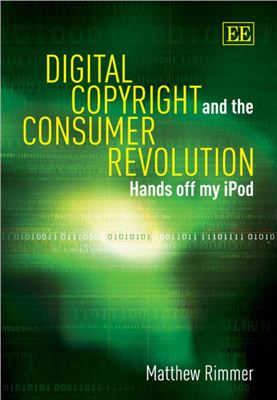Издательство Edward Elgar, 2007, -377 pp.
A late adopter of new technology, I received an iPod Shuffle, a hot ticket item, as a Christmas present in December 2005. Travelling across the Pacific from Australia to Canada on New Year’s Eve, I listened to one hundred and twenty songs drawn from my musical library. The personal soundtrack to my life included the psychedelic music of Pink Floyd and David Bowie; the agitprop pub rock of Midnight Oil, Hunters & Collectors, and the Cruel Sea; the Antipodean storytelling of singer–songwriters, David Bridie, Paul Kelly and Neil Finn; and the keening of country divas, Kasey Chambers, the Dixie Chicks and KD Lang. I was impressed that the MP3 player allowed me to engage in the ‘space-shifting’ of my musical collection, and the ‘time-shifting’ of Inteet broadcasts.
As an intellectual property academic, I was also intrigued by the implications of the iPod for copyright law. Apple Computers encouraged its customers to ‘rip, mix, bu’, yet waed them, ‘Don’t Steal Music.’ The one device could contain copyright works bought from the iTunes music store, copies of vinyl recordings and compact discs from home computers, as well as digital music circulated, without permission, on the Inteet and peer to peer networks. It struck me that the ‘white box’ deserved greater critical scrutiny and examination. There was a need to better explain the complex relationship between copyright law, new digital technologies and consumer behaviour.
This book has been enriched by my associations with a number of organizations. I am an associate director of the research centre, the Australian Centre for Intellectual Property in Agriculture (ACIPA), which is based at the Australian National University, the Griffith University and the University of Queensland. I am grateful for the help and support of all the researchers and administrators who have worked under its banner. I have also had fruitful discussions with members of the ‘Unlocking IP’ group based at the University of New South Wales, and the Centre for Goveance of Knowledge and Development at RegNet. I am a member of the Copyright and Intellectual Property Advisory Group of the Australian Library and Information Association (ALIA). This affiliation has heightened my appreciation of the wonderful work of librarians, archivists and information managers. I am also a director of the Australian Digital Alliance (ADA), an advocacy group,which represents the copyright interests of libraries, educational institutions and technology developers. This lobby group has sharpened my understanding of the abrasive politics of copyright law.
The dead poets society: the copyright term and the public domain
Remote control: time-shifting and space-shifting
The privateers of the information age: copyright law and peer-to-peer networks
The grey album: copyright law, digital sampling and mash-ups
Grand turismo in the high court: copyright law and technological protection measures
Agent Smith and the matrix: copyright law and intermediary liability
Google: search or destroy?
Remix culture: the creative commons and its discontents
Conclusion: a consumer’s manifesto, the declaration of innovation independence
A late adopter of new technology, I received an iPod Shuffle, a hot ticket item, as a Christmas present in December 2005. Travelling across the Pacific from Australia to Canada on New Year’s Eve, I listened to one hundred and twenty songs drawn from my musical library. The personal soundtrack to my life included the psychedelic music of Pink Floyd and David Bowie; the agitprop pub rock of Midnight Oil, Hunters & Collectors, and the Cruel Sea; the Antipodean storytelling of singer–songwriters, David Bridie, Paul Kelly and Neil Finn; and the keening of country divas, Kasey Chambers, the Dixie Chicks and KD Lang. I was impressed that the MP3 player allowed me to engage in the ‘space-shifting’ of my musical collection, and the ‘time-shifting’ of Inteet broadcasts.
As an intellectual property academic, I was also intrigued by the implications of the iPod for copyright law. Apple Computers encouraged its customers to ‘rip, mix, bu’, yet waed them, ‘Don’t Steal Music.’ The one device could contain copyright works bought from the iTunes music store, copies of vinyl recordings and compact discs from home computers, as well as digital music circulated, without permission, on the Inteet and peer to peer networks. It struck me that the ‘white box’ deserved greater critical scrutiny and examination. There was a need to better explain the complex relationship between copyright law, new digital technologies and consumer behaviour.
This book has been enriched by my associations with a number of organizations. I am an associate director of the research centre, the Australian Centre for Intellectual Property in Agriculture (ACIPA), which is based at the Australian National University, the Griffith University and the University of Queensland. I am grateful for the help and support of all the researchers and administrators who have worked under its banner. I have also had fruitful discussions with members of the ‘Unlocking IP’ group based at the University of New South Wales, and the Centre for Goveance of Knowledge and Development at RegNet. I am a member of the Copyright and Intellectual Property Advisory Group of the Australian Library and Information Association (ALIA). This affiliation has heightened my appreciation of the wonderful work of librarians, archivists and information managers. I am also a director of the Australian Digital Alliance (ADA), an advocacy group,which represents the copyright interests of libraries, educational institutions and technology developers. This lobby group has sharpened my understanding of the abrasive politics of copyright law.
The dead poets society: the copyright term and the public domain
Remote control: time-shifting and space-shifting
The privateers of the information age: copyright law and peer-to-peer networks
The grey album: copyright law, digital sampling and mash-ups
Grand turismo in the high court: copyright law and technological protection measures
Agent Smith and the matrix: copyright law and intermediary liability
Google: search or destroy?
Remix culture: the creative commons and its discontents
Conclusion: a consumer’s manifesto, the declaration of innovation independence

